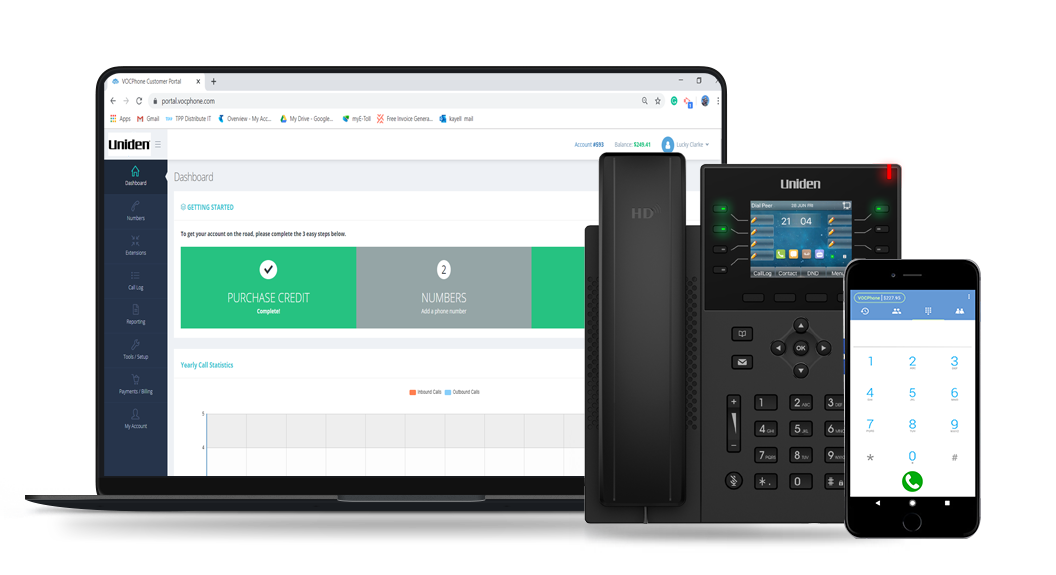
Decode customer intent with your phone system for business
Learn how cloud-based phone systems and call analytics work together to reveal what your customers want—before they say it.

Learn how cloud-based phone systems and call analytics work together to reveal what your customers want—before they say it.
Every call to your business is more than just a voice—it’s insight. Hidden within each conversation are clues to what your customers are thinking, feeling, and expecting from you. But without the right tools, these valuable signals often go unnoticed.
This is where call analytics comes into play. By integrating analytics into your cloud-based phone system for business, you can capture and interpret patterns in speech, call duration, tone, and behaviour. These tools don’t just tell you what was said—they help you understand why it was said.
Whether you're in sales, support or service, decoding customer intent helps your teams stay ahead.
It allows for personalised engagement, faster resolution, and better-informed decision-making—all of which translate into stronger loyalty and greater conversion. Let’s explore how to unlock the full potential of call analytics.

The length of a phone call can reveal more than just how much time a customer spent on the line. When analysed collectively, call durations show trends indicating frictions in your customer journey. Are customers hanging up before speaking to an agent? Are some conversations too long or too short? These patterns could suggest issues with menu navigation, wait times, or unclear agent responses. By integrating call duration tracking into your phone system for business, you can identify weak points and introduce fixes, like smarter routing, better agent training or automated callbacks, reducing churn and improving satisfaction.
Speech analytics lets you monitor the actual words customers use on calls. When synced with call recording, your system can track frequently used keywords and phrases to uncover common pain points or intent drivers. For instance, repeated mentions of “slow delivery” or “can’t log in” may flag systemic issues that require attention. Over time, these insights can be mapped to campaign effectiveness, product feedback or market changes. Businesses can also tailor scripts and FAQs to match real-world queries, ensuring that agents are aligned with what customers are asking. This real-time visibility helps prioritise improvements.
Understanding where calls are coming from—geographically or by marketing channel—and when they occur most often allows you to fine-tune operations. For example, if your team receives a higher volume of support calls from a particular region during weekday mornings, you can allocate resources to match the demand. Similarly, if most sales calls are being driven by a recent ad campaign, tracking the source confirms ROI and helps you adjust messaging. This level of visibility, powered by your phone system for business, ensures efficient staffing, targeted marketing, and better alignment between customer demand and company response.
Retail businesses, especially those online, rely heavily on customer calls for support, returns, delivery issues, and enquiries. A cloud-based phone system offers flexibility in managing high call volumes, routing calls to the right department, and recording interactions for quality control. Plus, call analytics helps identify purchasing behaviours, uncover barriers to checkout, and personalise service, leading to improved conversion rates and customer loyalty.
Healthcare providers need to manage appointment scheduling, patient follow-ups, and urgent care calls. Cloud-based phone systems offer secure and reliable call management with automated reminders, voicemail transcription, and more. Call analytics also supports better patient care by identifying peak times, improving response rates, and ensuring compliance with data privacy standards. It enables clinics to stay organised while offering a better patient experience.
Security is critical in industries like banking, finance, and insurance. A cloud-based phone system for business ensures encrypted, high-quality communication while allowing firms to log and review calls for compliance. Call analytics helps identify client intent—whether they're asking about rates, coverage, or concerns—enabling personalised service and timely follow-up. These tools also help monitor agent performance and adherence to regulatory standards.
For real estate agents and property managers, incoming calls could be new leads, tenants needing assistance, or clients requesting inspections. Cloud-based systems allow remote teams to manage calls on the go, while call tracking helps determine which marketing channels are generating leads. With call analytics, teams can quickly identify what prospective buyers or tenants are looking for, qualify leads more effectively, and increase property conversion rates.
In the travel sector, customer questions can be time-sensitive, ranging from booking queries to cancellations. Cloud-based phones help companies manage international calls, route calls to multilingual agents, and ensure availability even during seasonal spikes. Analytics allows providers to spot patterns in travel preferences, manage high-stress interactions, and provide better service. It also supports smoother communication between internal teams and vendors.
At Uniden, we understand that modern business communication goes beyond voice. Our cloud-based business phone systems are designed for flexibility, scalability and deep insight—empowering businesses of all sizes to decode customer intent, boost productivity and drive real outcomes. With user-friendly interfaces, reliable support, and advanced analytics tools, Uniden helps you transform conversations into valuable business intelligence.

Request a callback from our team to learn how Uniden can help you decode customer intent with the right phone system for business.
A business phone system offers features like call routing, analytics, voicemail-to-email, and multiple extensions, all designed to support customer communication at scale.
Call analytics uses data like call length, frequency, keywords, and sentiment to reveal customer behaviour patterns and improve service strategies.
Not at all. Even small teams gain value by identifying trends, managing customer satisfaction, and improving workflows using data from just a few calls.
Yes, modern systems like those provided by Uniden are built with encryption and compliant recording tools to ensure all data is handled responsibly.
Most cloud-based phone systems integrate easily with popular CRMs, helping you unify customer interactions and access full call insights from one dashboard.